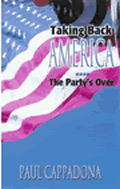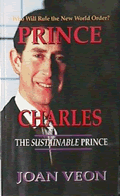Related
Articles:
Global Taxes Looming, Watch Your Wallet
Other
Veon
Articles:
US Leaders Highlight World Economic Forum Agenda
Global Taxation And Tax Harmonization
Does The
Global Economy Need a Global Currency?
FROM WORLD ECONOMIC FORUM: WANT TO KNOW THE FUTURE?
By
Joan Veon
January 27, 2006
NewsWithViews.com
When you want to know what the weather will be, you read the newspaper forecast and if that is not current enough, you go to the internet or the Weather Channel. When you want to know how your life will be affected as a result of political, economic, trade, and legal changes, you go to specific sources.
As a freelance reporter I stumbled onto the international level as a result naivet� and a lack of knowledge as to the real workings of the world. Little did I know when I saw the actors of world government discussing how the world was going to be run in 1994 at a UN conference, that I would end up identifying as many power sources as I could and then covering their meetings in order to understand what was really happening at the global level that the mainstream media was not explaining to �we the people.�
Early on, I found a number of very powerful meetings that have and are affecting how we live in an interdependent world. The annual meeting of the World Economic Forum-WEF in Davos, Switzerland is one of them. While many of us work for large multinational or transnational corporations, we are somewhat remote from the chief executive officer, even though his power is felt daily. Imagine what happens when you bring 1,000 CEO�s from the world�s largest and most powerful corporations along with the heads of state, international organizations like the United Nations, World Bank and International Labor Organization, non-governmental organizations, religious leaders, and royalty? Ideas flow and people and power connect. However, we need to ask, who really benefits?
As I have analyzed the attendees, there is an �inner core� of participants at the WEF who are members of some of the world�s most powerful organizations whose goal is a world governmental structure. They include the Royal Institute for International Affairs, now called the Chatham House, the Tri-Lateral Commission, the Council on Foreign Relations, the World Business Council for Sustainable Development, and the Prince of Wales International Business Leaders Forum. Sometimes you will see a Fabian socialist or an Oppenheimer, Rockefeller, and for the first time, Nathaniel Rothschild, who has been named a WEF Young Global Leader. Furthermore, every member of the British royal family has been here with the exception of the queen.
In a world where there are no barriers between the nation-states, this year�s meeting is focusing on a �post-knowledge world,� that is where the world is being transitioned from globalization to �Goggleization.� According to WEF Founder Klaus Schwab,
The assumptions, tools and frameworks that leaders from business, government, and civil society have employed over the past decade seem increasingly outdated. Globalization has become so entrenched and seemingly irreversible that we have even started to talk of a world that is flat. But if our world is indeed flat, it is not yet a uniform surface�our task is to make those connections better�with new rules, new institutions, and especially, through creative leadership (emphasis added).
It is apparent to most Americans when they go shopping, that the power of American manufacturing has been shifted to China since they have the largest pool of cheap-slave labor. It is also apparent to the white collar worker that India is now able to help their company reduce labor costs. Will outsourcing go away? No. There is a very major shift taking place in the global workforce. Not only are people migrating to find work�whether it be those from Nicaragua or Mexico who come to America but Africans are now migrating to Ireland for the same purpose: work. This is happening worldwide.
In a workshop on job, Labor Secretary Elaine Chao painted a rosy pink picture of the U.S. economy and how the federal government has put in place very expensive programs to provide laid off workers with all kinds of benefits during their time of re-education, a panel member asked her if it was really working when someone from the audience called out that most people and companies don�t qualify for it. It was then that she admitted the U.S. has a �skills gap.� Unfortunately, Ms. Chao looked pretty poor in the eyes of the audience as they snickered over some of her other pie in the sky remarks about small town re-employment. She did not spend too much time on how to re-educate a 50 or 60 year old with a high school level of education and no real developed skills.
Where are the jobs for the future? They are in healthcare, nursing (for a graying baby boomer generation), skilled trades such as plumbers, electricians, and construction workers, advanced manufacturing, nanotechnology, and biosciences to name a few.
In a global economy where the worker is being spun off as a result of the fast paced change of the work environment, I find it curious that there is much discussion about corporations ending their defined benefit programs and the need to make retirement benefits portable, along with healthcare benefits. Corporations, in an effort to reduce expenses and compete globally, are looking to provide every worker with portable benefits: healthcare and retirement. Look out�this is all coming to your employer soon. Is this a departure from the world we knew? Yes.
In a market-based world where the market is king, the care of the employee has been replaced by the demands of the market. Is that understandable? It would be more understandable if we were the CEO, pulling down a $20 million a year salary with life-time perks. However, in a society where the ability for a family to feed themselves by raising chickens, cows and vegetables has been replaced by the city and dependence on outside employment, this is reality. Is it civility?
In the ten years that I have covered global meetings and in all the time that I have devoted to understanding the international structure above the nation-state, I find there is a �global knowledge divide.� In other words, the American worker does not have any idea about what is happening outside of their 50 mile square circumference. People look at me as if I am a crazy lady when I start explaining the international structure above the nation-state. Why do all the other workers in the world understand this and yet Americans do not? None of our politicians are willing to real tell Americans what they have done to change it.
Several years ago, I confronted Elaine Chao about the 20 million manufacturing jobs that were sent to China. She was very terse as she explained that it is up to the average worker to look ahead in order to determine if they have the right skills. Unfortunately, the average American is pretty dumbed down and does not think they have to because America is America. However that America is vanishing.
At every turn here at the World Economic Forum, the discussion is on the rise of India and China and how they will affect a US-centric world. The overall opinion is that the possibility of the U.S. losing its grip on the world is not too far fetched. The post-knowledge world says �cheaper, faster and better� is not enough, you need the right employee with the right skills for the right job and if that means outsourcing that is the reality. In a technological world, you can find employees anywhere in the world, all they need is a computer hook-up.
According to MorganStanley economist, Stephen Roach, the American consumer has been spending stock and home equity savings and will not have too much more to spend in the near future, thus shifting the need for a consumer based economy to China and India�s rising classes. In other words, the ability for the American consumer to carry the world comes at our expense.
|
Subscribe to the NewsWithViews Daily News Alerts! |
With
regard to an interconnected world, this year�s forum will sponsor
a discussion on a �new mindset for the UN.� Thursday�s session will
discuss why the world needs a UN and how to strengthen its credibility.
It should be noted that the UN was given a major power boost in 2000
and then last September. Their power has been evolving for over 60
years. Interestingly enough, the UN has never has power to enforce,
because it is a voluntary organization. Because of the number of global
rules and regulations that are not mandatory, there is now discussion
about giving the UN the �right to enforce.� It should be noted that
at every WEF, there is usually a number of powerful U.S. cabinet members,
senators, and congressmen interacting to consensus. The bottom line,
if you want to know your future, you need to look up to the international
level and pay attention to meetings like this.
� 2006 Joan Veon - All Rights Reserved
Sign Up For Free E-Mail Alerts
E-Mails
are used strictly for NWVs alerts, not for sale
 Order
Joan Veon's book;
Order
Joan Veon's book;
"The
United Nations'
Global Straitjacket"
Joan Veon is a businesswoman and international reporter, having covered 64 Global meetings around the world in the last ten years. Please visit her website: www.womensgroup.org. To get a copy of her WTO report, send $10.00 to The Women's International Media Group, Inc. P. O. Box 77, Middletown, MD 21769. For an information packet, please call 301-371-0541
E-Mail: jveon@adelphia.net
In the ten years that I have covered global meetings and in all the time
that I have devoted to understanding the international structure above
the nation-state, I find there is a �global knowledge divide.� In other
words, the American worker does not have any idea about what is happening
outside of their 50 mile square circumference.











